What to Pack for an African Safari


Congrats on booking your safari! You’ll have the trip of a lifetime – just as long as you pack appropriately. It should go without saying, but check your passport for validity and ensure you have all required visas. The US Department of State travel website should have all the necessary information. Beyond that, you’ll need a few essentials, which I’ve detailed below.
Because safari camps are often accessed by light aircraft or helicopters, soft-sided luggage is required to fit into the smaller cargo compartments. The weight limit varies by provider, but it is usually around 44 lbs. Most camps offer laundry service, so you don’t have to overpack. If you don’t want to spend too much, we like the classic North Face Base Camp duffel. For something more stylish, check out the Filson Twill Duffel Bag.
Pack natural-colored clothing with an emphasis on greens and tans. Camouflage is reserved for rangers in many African countries, so unfortunately, that isn’t allowed. Bright colors like white, red, orange, and yellow will attract too much attention from the animals, and dark colors like black and blue attract insects. Those are best avoided. We like Onno t-shirts because the bamboo fabric is biodegradable but wicks sweat better than cotton. Also, bring layers of clothing, including a sweater or a light jacket, because mornings can be quite cool and afternoons can be hot.
Tipping is expected and appreciated for good service on a safari. Guides are generally tipped $10-20 per person per day, and there is usually a jar for camp staff to share additional tips of $10-20 per day. In Kenya, Tanzania, and South Africa, tips are expected in the local currency, while local currencies and US Dollars are accepted in Botswana, Zimbabwe, and Zambia.
Consult your doctor about prophylactics when visiting malarial areas. However, the risk is relatively low in the dry season. Bring a repellant if you have a brand you like, but good camps will have both sprays and mosquito nets. Tse tse flies can be an issue in some parts of Tarangire National Park and Kafue National Parks, but control measures are in place in other areas. Long, loose-fitting clothing that is a natural color will help prevent bites.
Most good camps will provide a pair of binoculars, so I usually leave mine at home to save the weight. You will be a lot closer to the animals than you think! As you would imagine, safaris are great for wildlife photography and dramatic lighting, so bring a camera with a telephoto lens if you want to capture the moment. Reminder to take some time away from the camera to enjoy the experience because you’ll be back home dreaming of your time in the bush before you know it.
You have a plethora of choices when booking an epic luxury trip, and we have the expert knowlege to make your travel dreams a reality. Contact us for a free consultation to discuss your options.